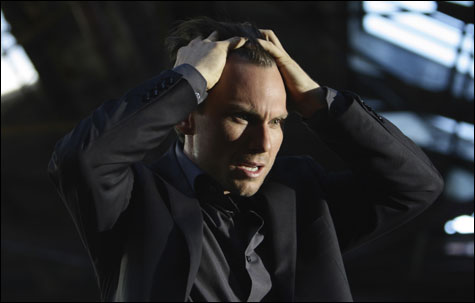
WHAT HAPPENED, CHRISTIAN? You used to be so sly, so sexy. Now you keep running those possibly meaningful hands through your greasy, thinning hair. |
Two men. One body. It sounds like the title of a squeamish sequel to “Two Girls, One Cup.” But the good news is it’s just the premise of My Own Worst Enemy, Christian Slater’s foray into the world of crappy small-screen dramas that use a lexicon of jargon in order to sound “sciency.”
Slater’s Henry Spivey is a regular golly-gee working man who lives a regular life with a regular wife and kids. The twist: not only does Henry have a government-operative alter ego named Edward Albright, but, through the magic of thoroughly improbable television bio-technology, he doesn’t even know that Edward exists! Turns out “Henry” is just a cover, one who is blissfully unaware of his nefarious other self. It’s like a combination of Fight Club, The Truman Show, and the Bourne trilogy, without all kinds of fussy nonsense like good acting and writing to get in the way of what Slater does best — quizzically raising his eyebrows.

When Henry morphs into Edward, and vice versa, he first experiences eye-squinting lightheadedness (indicated by a mélange of unintentionally comic wincing); that’s followed by a blackout and then total dissociation. This Jekyll-and-Hyde switcharoo is made possible through — what else — a computer chip the government planted in Henry/Edward’s brain that allows Edward (the Alpha personality) to control whose identity is front-and-center at any given time. That is, until the chip goes haywire and we get Henry becoming Edward becoming Henry becoming Edward at random intervals. Thanks to this glitch, Henry becomes aware of Edward’s existence, and the two-in-one doppelgänger begin to communicate with each other by recording video messages on a cellphone.
Which raises the question: if government-employed scientists could invent technology that allows one man to split his Freudian id/ego/superego three-fer between two personalities, why can’t they just fix the damned thing when it breaks? Or implant Henry/Edward with a new chip?
Besides plot idiosyncrasies, the show is riddled with terrible acting and bouts of amateurish cinematography that may or may not be imbrued with deeper meaning. Were any of the characters remotely likable, it might warrant reading something into repeated fleeting shots of miscellanea like, say, Henry/Edward’s hands folded in his lap. But they’re not. So it doesn’t.
Other major characters include Mavis (Alfre Woodard, Edward’s spy boss), Dr. Skinner (Saffron Burrows, Henry’s therapist), and Henry/Edward’s best friend, Tom Grady (Mike O’Malley), who isn’t a superhuman quarterback for a New England football team but the alter ego of another government spy, Raymond. Both Henry and Tom are married to female stereotypes who spout complacent dialogue about soccer practice and refrigerators and, though suspicious about their respective husbands, always get put in their place by a cockamamie Swiss-cheese alibi concocted by the Big Bad Government.
The bad news is, Slater’s caricature of Henry/Edward is his own worst enemy. Oh Christian. What happened, honey? You used to be so sly, so sexy. The 1980s and early ’90s were your devil-may-care heyday, as you preened your way through Heathers, Gleaming the Cube, Pump Up the Volume, and, every swooning teenage girl’s favorite, Robin Hood: Prince of Thieves. Whether you’re the victim of age, beastly screenwriting, or genuine delusion, for the love of God, please stop scrunching your face up and running those possibly meaningful hands through your greasy, thinning hair. Even those glorious eyebrows can’t convince the world that this is a show worth our staying up past our Monday-night bedtime.